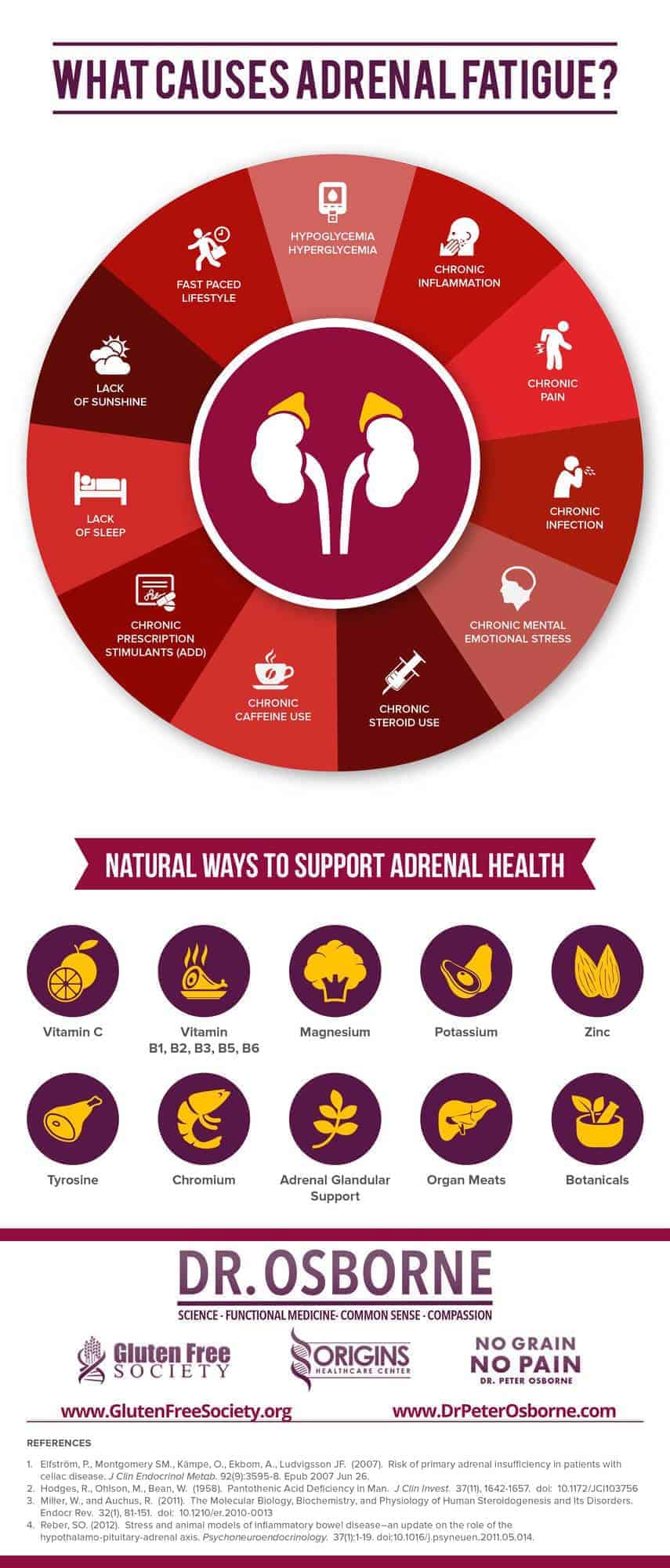new to the gluten free journey?
new to the gluten free journey?

Contents
Toggle With all of this happening, it’s no surprise that many of us are dealing with a real fear of how to provide for and protect our families. Our bodies are in a constant struggle of fight or flight mode and attempting to manage chronic stress is threatening to destroy our health. Your adrenal glands can only take so much. So how exactly do we get out of this physical and emotional state when outside conditions threaten to keep us in it?
With all of this happening, it’s no surprise that many of us are dealing with a real fear of how to provide for and protect our families. Our bodies are in a constant struggle of fight or flight mode and attempting to manage chronic stress is threatening to destroy our health. Your adrenal glands can only take so much. So how exactly do we get out of this physical and emotional state when outside conditions threaten to keep us in it?
 Another important step to helping manage chronic stress is eating a proper diet to receive proper nutrition. One of the side effects of stress is an increase in carb and sugar cravings. People tend to gravitate toward their “comfort food” like cookies, cake, and ice cream, which may cause satisfaction for a time, but ultimately leads to increased cravings. And if those cravings happen to contain gluten as well, you are in for an even bigger problem.
With an increase in sugar comes an increase of yeast in the GI tract, leading to another hardship on the body, inflammation. Alcohol is another comfort many turn to in times of trouble. However, it also contains a significant amount of sugar, is an immunosuppressant, and can cause liver damage and inflammation. I have personally made this mistake a few times this year.
Another important step to helping manage chronic stress is eating a proper diet to receive proper nutrition. One of the side effects of stress is an increase in carb and sugar cravings. People tend to gravitate toward their “comfort food” like cookies, cake, and ice cream, which may cause satisfaction for a time, but ultimately leads to increased cravings. And if those cravings happen to contain gluten as well, you are in for an even bigger problem.
With an increase in sugar comes an increase of yeast in the GI tract, leading to another hardship on the body, inflammation. Alcohol is another comfort many turn to in times of trouble. However, it also contains a significant amount of sugar, is an immunosuppressant, and can cause liver damage and inflammation. I have personally made this mistake a few times this year.

Stay up-to-date with the latest articles, tips, recipes and more.

*These statements have not been evaluated by the Food and Drug Administration. This product is not intended to diagnose, treat, cure or prevent any disease.
If you are pregnant, nursing, taking medication, or have a medical condition, consult your physician before using this product.
The entire contents of this website are based upon the opinions of Peter Osborne, unless otherwise noted. Individual articles are based upon the opinions of the respective author, who retains copyright as marked. The information on this website is not intended to replace a one-on-one relationship with a qualified health care professional and is not intended as medical advice. It is intended as a sharing of knowledge and information from the research and experience of Peter Osborne and his community. Peter Osborne encourages you to make your own health care decisions based upon your research and in partnership with a qualified health care professional.
8 Responses
Working in my studio and taking online art classes!
I’m working on lots of UFO quilt projects and reorganizing my sewing studio.
I feell like I’m the only one who thinks the epidemic is not real besides dr. O and a few others .. but most are followers like sheep / robots …. nobody has faith . They believe anything they read on Facebook , Internet , social media , news etc,. They have no common sense . I am more scared just watching people fold and do what whatever government tells them . They don’t look at the Real numbers , it’s he said she said , No statistics, nothing they just take the News etc. as the real thing . No common sense … frustrated here in California . I have a business . I haven’t closed but have snuck people in through the back door . My clients I’ve had forever . It’s one on one . I don’t really have to work but I love what I do . I just don’t believe in this plandemic . I really think it came from China in the flu shot that that They give elderly people . The last few years they have been giving elderly a stronger dose . I’ve notice that when this happens they get a bronchial infection about a 3 weeks to a month later they also are asked if they want a Nemonia shot as well . This is something that is always asked every time you go into the doctor . As you know I’m sure . So in a convalescent hospital I’m sure it is manditoty. therefore would explain the out break . Just my theory . Worried about the next breakout in September when they start offering the flu shot again or maybe the covid shot!🤦🏻♀️That will be called the second wave I’m sure . Just today Governor New sense (I call him). Made it mandatory to were mask at all time while out and about … omgosh … can you believe it . Me and my husband retired cop and marine feel very alone in how we feel . I know there is more people out there like us and the election will prove that . Trump is awesome and he is doing a great job considering everything he has had to battle with . He was made president because who he really is . He loves our county . I pray he wins again . In fact I know he will …
Thank you for all your hard work and what you do Dr.O
always looking out for you , lol
Tonya
As for hoaxes, you have only to look at what happened in NYC before mandatory precautions were instituted. Refrigerated trucks because the morgues had not space. Hospitals and frontline workers being overwhelmed, not enough PPE – on one ordinarily reuses a mask, for heaven’s sake. Except me for economy when I was doing boatbuilding years ago.
Johns Hopkins University is probably the most reliable source for statistics. Most scientists are more concerned with scientific truth – devoted to it, really – than politics. The NYTimes cites its sources for all articles, including the statistics they report. It’s not haphazard. Meanwhile, the rest of the country shows a continuing upward curve of infections while NY, after their weeks of blowing it, finally got their act together based on better data and the willingness (Pubic Health and the Governor taking their strict recommendations) to realize that things would continue spiraling out of control without major precautions. Once instituted, the upward curve became less steep, finally leveled off, and now they are down to around 1 or less infections transmitted for every person infected. It had been up between 2 and 3, or higher if I recall. Obviously, density of population and being a major international economic hub was a factor in the huge number of infections in the beginning. Now, NY state shows a downward trend, and their reopening without increasing infections is continuing as the different criteria are met, unlike the rest of the country. Hawaii is also doing very well. Politico has a great article on what they did to bring new infections down, and the learning process for them and the initial conflicting viewpoints of health experts, health officials, and local politicians. I was impressed. New Zealand and South Korea are other examples.
I wanted to know what New Yorkers were doing right when I saw that infections were going down, and also saw the compassion and strength of their governor. Unlike Hawaii, NY used in the beginning a “wait and see” attitude, which is bad medical practice, with catastrophic results, so I signed up for Gov. Cuomo’s daily Covid-19 update, and read up on the state’s criteria for reopening. NY is reopening as the different regions meet the criteria, including a drop in infections, while the rest of the country shows in general, an increase. The NYTimes published some interesting graphs (sources of data cited as usual). Very, very interesting.
Personally, I have a strong immune system. But as we know, transmission can occur from people who don’t show symptoms. So, I wear a mask in compassion for others whose immunity may not be so strong. If you read reports on the medical side of covid-19, you know that people can even have major lung damage before they show any symptoms. Finally they go to the ER after feeling short of breath. Meanwhile, if they didn’t practice good hygiene and precautions to prevent transmission to others before they experienced “silent hypoxia” as it is called, they put others at risk. And other organs are damaged too. It’s a serious illness. The pasteur of a church held services despite the health law prohibiting indoor gatherings. Over a hundred of his congregation came down with covid-19, and if I recall, seven died. How does he feel now?
BTW, the NYTimes has a section at the bottom of their Covid-19 Update newsletter, which is a paragraph of what people wrote in to say how they are coping with lockdown. The Times is not all about bad news. I use the news.google.com news feed, which offers a huge variety of news publications (usually 2-5 headlines about major topics, which include science, health, entertainment, sports, business, and world news) and of course viewpoints. Clicking on the three dots under each headline, you can choose which kind of articles you want, or whether to hide all articles, etc.
I wish you the best, and hope that for the sake of others, if not yourself, you’ll take the precautions and disease seriously.
Connecting to God/ Jesus as much as possible by reading my bible, watching online church services, praying, meditating and talking directly to God when really necessary (writing down His messages to help me not forget them and to be able to look back on them when I am struggling). Spending time outdoors and in the sun, grounding, walking, bike riding. Playing/ connecting with my children is also helpful (reading children’s novels to them to escape temporarily from the insanity of our current world, is a favorite thing). Lastly, crying. When the darkness of the world seems too heavy to bear, letting myself be sad and just grieve. The trauma of this is very real, so I am trying to be gentle with myself and others too.
Thanks for all you do Dr. Osborne! I really appreciate your bravery and conviction in speaking your truth about the current world situation on your weekly show. Finally some sanity and common sense! Those shows have helped me during this difficult time. Stay well and blessed!
Watching your sensible programmes helps! Time in my own garden, and voluntary weeding for old friends is a great connection with nature.
good job
NATURE, GRATITUDE